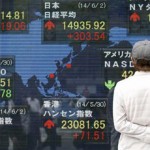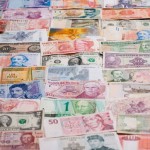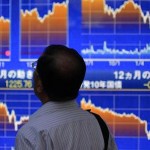Asian Stocks Rise With Won, Mexican Peso on U.S. Election Day

-
S&P 500 futures slip after gauge snaps nine-day losing streak
-
Industrial metals reverse gains as gold edges higher
Asian equities rose with South Korea’s won and the Mexican peso as Americans prepare to vote in their presidential election with opinion polls showing Hillary Clinton ahead of Donald Trump. A hint of caution was evident with U.S. stock index futures losing ground and gold gaining.
The MSCI Asia Pacific Index extended the last session’s rebound from a seven-week low after the S&P 500 Index snapped a nine-day losing streak. The won and Mexico’s peso were the best performers among major currencies, a sign of investors’ confidence that Trump and his protectionist trade policies will be rejected in the vote. Haven assets stabilized, with the yen and gold edging up from their lowest levels in a week. Copper and nickel retreated from one-year highs, while crude oil held below $45 a barrel.
On websites that take wagers on the election winner, Democratic candidate Clinton’s odds of victory are generally near or above 80 percent, boosted by Sunday’s news that the Federal Bureau of Investigation won’t revisit its decision against seeking criminal charges related to her e-mail practices while Secretary of State. Global equities slumped last week and haven assets rallied after the FBI said on Oct. 28 that it had reopened a probe into her communications.
“Markets are currently in the grip of a risk-seeking mood following the latest FBI news, which is perceived as raising the chances of a Clinton win,” said Imre Speizer, a market strategist at Westpac Banking Corp. in Wellington. “A Trump win would cause a major reversal of the recent moves, so markets will be mostly preoccupied by the election during the day ahead.”
The election results are expected to be announced during morning trading in Asia on Wednesday, offering some prospect of calm on Tuesday as investors digest China trade data for October. Exports from Asia’s biggest economy dropped 7.3 percent from a year earlier in dollar terms, more than the 6 percent decline forecast in a Bloomberg survey.
Stocks
The MSCI Asia Pacific Index added 0.4 percent as of 3:01 p.m. Tokyo time, led by gains in raw-materials producers. The Shanghai Composite Index climbed to a 10-month high as benchmarks advanced across the region.
Futures on the S&P 500 Index — which ended its longest run of declines since 1980 on Monday — declined 0.1 percent and contracts on the U.K.’s FTSE 100 Index gained 0.3 percent.
While riskier assets are generally climbing before the U.S. election, trading patterns around the U.K.’s referendum over European Union membership provide a cautionary tale. A similar rally in stocks, emerging markets and commodities on the day of the British vote gave way to a slump — and a rebound in haven assets — after the unexpected decision in favor of Brexit. The outlier this time around is the dollar, which is strengthening, having weakened before Britain’s plebiscite.
Currencies
Mexico’s peso, which tends to gain when Trump has a setback, appreciated 0.1 percent to about 18.58 a dollar after rallying 4.2 percent over the last three trading sessions. Nomura Holdings Inc. says the currency is likely to sink to 25 by year-end in the event of an election victory for Trump, who has said he will end or renegotiate the North American Free Trade Agreement that governs trade between Mexico and the U.S.
The yen was up less than 0.1 percent at 104.38 per dollar, after sliding 1.3 percent in the last session. The Japanese currency would probably strengthen to 99.50 within 24 hours of a Trump victory, and slip to 105.25 if Clinton wins, according to Scott Petruska, a Newton, Massachusetts-based senior adviser at SVB Financial Group.
“Although we have seen an improvement in risk appetite over the past 24 hours, markets remain wary of an election shock,” said Rodrigo Catril, a currency strategist at National Australia Bank Ltd. in Sydney. “A dollar-positive reaction is likely on news of a Clinton victory; a likely ‘risk off’ reaction to a Trump victory would mean dollar losses versus yen, Swiss franc and euro but gains elsewhere.”
South Africa’s rand weakened 0.5 percent and Australia’s dollar declined 0.3 percent, the biggest losses among major currencies. The Bloomberg Dollar Spot Index was little changed after surging 0.4 percent in the last session.
Commodities
Gold was up 0.1 percent at $1,283 an ounce, after sliding 1.8 percent from a one-month high in the last session. It surged 2.3 percent last week as opinion polls indicated Clinton’s lead over Trump was narrowing.
Crude oil held near $45 a barrel in New York, after climbing 1.9 percent on Monday from its lowest close since September. Russia, the world’s biggest energy producer, is “on board” with an Organization of Petroleum Exporting Countries agreement to limit production to help re-balance the market, according to the group. U.S. government data on Wednesday are forecast to show the nation’s stockpiles expanded by 1.5 million barrels last week.
Copper fell 0.3 percent in London and nickel was down 0.1 percent, after earlier rallying as much as 2.2 percent. The global nickel market faces a second year of shortage in 2017 as contracting ore shipments from the Philippines prompt China to trim output, according to Sumitomo Metal Mining Co., Japan’s top producer.
A recent improvement in commodity prices is due to growth in global manufacturing and higher demand from China, according to Adrian Mowat, JPMorgan Chase & Co. analyst. The increase in metals despite dollar strength shows the move is driven by fundamentals, he said.
U.S. Treasuries due in a decade yielded 1.82 percent, down one basis point on the day. The rate jumped five basis points in the last session as investors shunned haven assets amid a pickup in expectations that Clinton will win the U.S. election and pave the way for the Federal Reserve to raise interest rates next month. The probability of a hike at the next review is 80 percent, up from 76 percent on Friday, futures prices showed before Fed Bank of Chicago President Charles Evans speaks Tuesday.
The yield on Australia’s 10-year government bonds held near a one-week high of 2.36 percent. Franklin Templeton said it is betting the Reserve Bank of Australia will cut its benchmark interest rate to 1 percent by mid-2017 from an already record low 1.5 percent. The swaps market was pricing the probability of that at just 4 percent on Tuesday in Sydney.
The cost of insuring corporate and sovereign bonds against default in the Asia-Pacific region fell to a two-week low, according to prices from Westpac Banking Corp. and data provider CMA.
Source: Bloomberg – Asian Stocks Rise With Won, Mexican Peso on U.S. Election Day





























